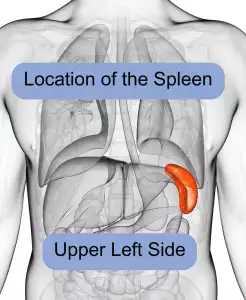By Qineng Tan, L.Ac., Ph.D. and Xiaomei Cai, L.Ac., Ph.D.

Left side abdominal pain that is tender to the touch? Feeling full after eating a small amount? Signs of anemia, bleeding easily? These may be enlarged spleen symptoms. Acupuncture and TCM can help with splenomegaly, along with spleen function and swollen spleen symptoms.
Splenomegaly is the medical term for an enlarged spleen. In conventional medical wisdom, the spleen is an organ that stores and filters blood, regulating the amounts of red blood cells, white blood cells, and platelets that are in circulation.
The spleen removes waste products and damaged blood cells from the bloodstream. It also produces antibodies (white blood cells) that fight germs and infection.
The spleen is located inside the left side of the ribcage, just above the stomach. Usually, the spleen is about the size of your fist—on average, about 12 centimeters long.
People often will not be aware of an enlarged spleen, but in some cases, there will be noticeable signs, such as pain in upper left abdomen and feeling “full.”
Spleen function is considered very important for overall health and happiness in TCM. Acupuncture treatment and Chinese herbs can provide an adjunct or alternative treatment for enlarged spleen.
Enlarged Spleen Symptoms
The most common swollen spleen symptoms include:
- Left upper quadrant pain, pain behind left ribs, left abdominal pain (upper abdomen), left side abdominal pain
- Pain that radiates to the left shoulder
- Feeling full even when you haven’t eaten
- Feeling full after eating only a small amount
- Anemia, low red blood cell count
- Bruise easily
- Bleeding easily
- Fatigue
- Catch colds frequently or suffer from other infections often
If you experience tenderness or serious left abdominal pain and feel dizzy, and/or have a rapid heartbeat, it is important to seek care immediately. These could be signs of ruptured spleen, which can lead to internal bleeding that could be life-threatening.
Enlarged Spleen Causes

There are several different conditions that can cause the spleen to become enlarged. What causes a big spleen, or should we say, bigger spleen?
Some of the health issues that can cause splenomegaly include:
- Liver cirrhosis, or other liver disease
- Viral hepatitis, Mononucleosis, or other viral infections
- Different types of hemolytic anemia
- Blood cancers, including: polycythemia vera and other myeloproliferative neoplasms, Leukemia, lymphoma, Hodgkin’s disease
- Blood clot near the spleen or liver
- Autoimmune disorders, including Lupus or Sarcoidosis, or rheumatoid arthritis (RA)
- Malaria, or other parasitic infections
- Bacterial infections
- Gaucher disease or Niemann-Pick disease
Medical Treatment for Enlarged Spleen
The treatment of splenomegaly in Western medicine primarily depends on addressing the underlying cause of the condition.
When an enlarged spleen is caused by infections like viral hepatitis or mononucleosis, the focus is typically on treating the infection itself. Antiviral medications may be prescribed to manage viral hepatitis, while mononucleosis, caused by the Epstein-Barr virus, usually requires supportive care. Rest, hydration, and over-the-counter pain relievers like acetaminophen or ibuprofen may be recommended to alleviate symptoms. In some cases, particularly when there’s a risk of the spleen rupturing, patients may be advised to avoid contact sports or strenuous activities.
For blood disorders that cause an enlarged spleen, treatment typically involves managing the specific blood condition. For example, in hemolytic anemia, where red blood cells are destroyed faster than they can be produced, treatments may include blood transfusions, corticosteroids to suppress the immune system, or medications like rituximab.
In conditions like polycythemia vera, where there’s an overproduction of red blood cells, treatment might involve phlebotomy (removing blood from the body) to reduce blood volume, or medications like hydroxyurea to suppress the bone marrow’s production of blood cells.
When liver disease such as cirrhosis is the cause of splenomegaly, the treatment approach focuses on managing the liver condition. Cirrhosis management may include lifestyle modifications such as reducing alcohol intake, using medications to control liver damage, and managing complications like portal hypertension. In severe cases, a liver transplant may be considered. Controlling the liver condition can help reduce spleen enlargement.
In cases where the spleen enlargement is due to cancers like leukemia or lymphoma, treatment usually involves chemotherapy, radiation therapy, or targeted drug therapies to address the cancer. The goal is to reduce the size of the spleen by shrinking the cancerous cells that are contributing to its enlargement. In certain situations where the spleen is significantly enlarged and causing symptoms, or if it’s not responding to other treatments, splenectomy (surgical removal of the spleen) might be recommended.
Autoimmune disorders like lupus or rheumatoid arthritis can also cause splenomegaly. Treatment for these conditions often involves immunosuppressive medications such as corticosteroids, methotrexate, or biologic agents that target specific parts of the immune system. By controlling the underlying autoimmune disorder, the symptoms associated with spleen enlargement can often be managed effectively.
When does an enlarged spleen need to be removed?
In some cases, if the spleen is severely enlarged or if it’s causing significant symptoms or complications (such as a high risk of rupture), a splenectomy may be considered. This surgical procedure involves removing the spleen entirely. While splenectomy can relieve symptoms and prevent complications, it also has long-term implications, as the spleen plays an important role in the immune system. Patients who undergo splenectomy may require vaccinations and prophylactic antibiotics to reduce the risk of infections.
Unless the spleen is ruptured, in most cases, a splenectomy is not necessary. Trying a holistic approach with TCM and acupuncture may be able to help relieve symptoms and improve spleen function.
Can Acupuncture Help Enlarged Spleen?

Traditional Chinese Medicine takes a different few of key organs and organ systems than we are used to in modern medicine.
In TCM, the spleen is considered vital to the digestion of food, working in harmony with the stomach. The spleen is also partially responsible for the transport of blood and water throughout the body, delivering nutrition to the muscles.
The spleen is also vital to the proper excretion of waste. When there is a buildup of excessive fluids or “dampness” in the body, it is often due to a deficiency of the spleen.
Fatigue and a sense of fullness after eating are considered signs of spleen deficiency, which can affect whether or not other organs are getting the nutrition they need.
Problems with the spleen may also be related to the liver and/or the stomach, so the acupuncture practitioner will carefully look at all of a patient’s presenting symptoms to determine the appropriate diagnostic pattern and course of treatment.
In TCM, organs are related to certain emotions, and the spleen is connected to anxiety. Thus, worrying, overthinking, and other manifestations of anxiety are believed to negatively impact the spleen.
TCM treatment to help strengthen spleen function may focus on clearing stagnation and dampness, and improving circulation of blood and Qi. Your acupuncture provider can develop a course of treatment with acupuncture and herbs to address the underlying causes of an enlarged spleen, while also helping to relieve any symptoms of splenomegaly.
Acupuncture for Enlarged Spleen Near Me in West Los Angeles
If you are experiencing enlarged spleen symptoms, acupuncture and TCM offer holistic approaches that can support spleen function and address the root causes of various health issues. At Art of Wellness, our experienced practitioners can help tailor a treatment plan to your unique needs. Contact us today to learn more about how TCM can benefit your health and well-being.
*This article is for education from the perspective of Traditional Chinese Medicine only. The education provided by this article is not approved by FDA to diagnose, prevent, treat and cure human diseases. It should not stop you from consulting with your physician for your medical conditions. Traditional Chinese Medicine is based on Qi, which is an invisible force that usually cannot be observed by modern science. Because science focuses on testing ideas about the natural world with evidence obtained through observation, these aspects of acupuncture can’t be studied by science. Therefore acupuncture and Chinese herbs are often not supported by double-blind, randomized trials, and they are considered alternative medicine therapies in the United States.
